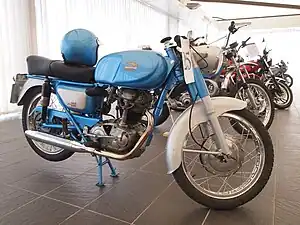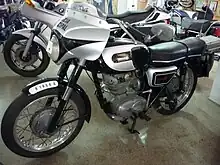Ducati Deluxe
The Ducati Deluxe is a 247 cc (15.1 cu in) single cylinder bevel drive SOHC motorcycle produced by the Spanish manufacturer MotoTrans, who were licensed by Ducati to produce motorcycles under the Ducati brand name. The model was based on the 'narrow case' Ducati Diana 250[3] and produced from 1963 to 1973. The Deluxe was, in terms of production numbers, MotoTrans' most successful model.[4]
 Ducati Deluxe | |
| Manufacturer | Ducati/MotoTrans |
|---|---|
| Production | 1963-1973 |
| Successor | Ducati Road 250 |
| Class | Standard |
| Engine | Air-cooled bevel drive SOHC single cylinder four stroke |
| Bore / stroke | 69 mm × 66 mm (2.7 in × 2.6 in) |
| Compression ratio | 8:1 |
| Top speed | 130 km/h (81 mph) |
| Power | 20 bhp (15 kW) @ 7,000 rpm |
| Transmission | Multiplate wet clutch, 4 speed |
| Frame type | Single cradle |
| Suspension | Front: telescopic forks Rear: swinging arm |
| Brakes | Drum front & rear |
| Tyres | 275x18 front & rear |
| Wheelbase | 1,320 mm (52 in) |
| Weight | 110 kg (240 lb) (dry) |
| Fuel capacity | 18 L (4.0 imp gal; 4.8 US gal) |
| Footnotes / references [1][2] | |
History
In post-Civil War Spain, the Franco regime banned the import of motorcycles[5] and also forbade foreign nationals from settling in Spain, or stating a business there.[6] Moto Guzzi and MV Agusta motorcycles had been manufactured in Barcelona, Spain under licence by Moto Guzzi Hispania and MV Alpha since the late 1940s.[6][7][8] MotoTrans was set up to manufacture Ducati motorcycles under licence in Barcelona in 1957.[9][10]
Bultaco and Montesa had both introduced their second generation two strokes, which had better performance than the Spanish Ducatis. This prompted MotoTrans to produce a 250 based on the Italian Diana. Suitable cylinder liners for the 250's 74 mm (2.9 in) bore could not be obtained in Spain, so the liners from the 200 cc Elite were used, bored to 69 mm (2.7 in). The stroke was increased to 66 mm (2.6 in) to give a 247 cc (15.1 cu in) displacement.[4]
There were minor changes during the production life such as handlebars and mudguards. The machines were finished in blue and metallic silver, except for a few machines that were exported to the UK and finished in Black and silver.[2] A five speed gearbox was fitted from late 1970.[4]

A version of the Deluxe was used by the Guàrdia Urbana de Barcelona and other police forces.[11]
In 1973, the final year of production, the model was updated using the 25 bhp (19 kW) engine from the 24 Horas/Road, the wider wheels of the Road and the seat, instruments and headlight of the 24 Horas. The 73 model was finished in cherry red and old gold.[1][2][4]
Technical details
Engine and transmission
The single cylinder bevel drive OHC engine was of unit construction and had an alloy head and alloy barrel with cast iron liners. Bore and stroke were 69 mm × 66 mm (2.7 in × 2.6 in) giving a displacement of 247 cc (15.1 cu in). An 8:1 piston was fitted. Claimed power output was 20 bhp (15 kW) @ 7,000 rpm, giving the machine a top speed of 130 km/h (81 mph).[2] Power was increased to 25 bhp (19 kW) for 1973.[4]
Fuel was delivered by either a 24 mm Dell'Orto UB or a Spanish made Amal Monobloc 376/25 carburettor. The engine used wet sump lubrication and ignition was by battery and coil.[2]
Primary drive was by gears to a multi-plate wet clutch and 4 speed gearbox. Chain drive took power to the rear wheel.[2] A 5 speed gearbox was fitted from 1970.[4]
Cycle parts
The single cradle frame used the engine as a stressed member. Rear suspension was by swinging arm with twin adjustable shock absorbers. At the front telescopic forks were fitted. Brakes were drums, the front being 180 mm (7.1 in) diameter and the rear 160 mm (6.3 in).[2]
References
- Svenson 2013a.
- Mototrans.
- Artsvalua.
- Burgaleta 2013.
- Cloesen 2014, p. 52.
- Svenson 2013b.
- Gingerelli, Michels & Everitt 2011, p. 216.
- Svenson 2013c.
- Herreros & Aznar 1998, pp. 88–90.
- Walker 2002, p. 51.
- Orengo & Herreros 2011, p. 42.
Bibliography
- Burgaleta, Pepe (24 May 2013). "Ducati De Luxe 250". Motociclismo (in Spanish). Retrieved 7 November 2021.
- Cloesen, Uli (15 August 2014). Italian Café Racers. Dorcester: Veloce Publishing Ltd. ISBN 978-1-84584-749-4.
- Gingerelli, Dain; Michels, James; Everitt, Charles (10 January 2011). 365 Motorcycles You Must Ride. Minneapolis, MN: Motorbooks. ISBN 978-0-7603-3474-4.
- Herreros, Francisco; Aznar, José Luis (1998). "1945: Cataluña". Historia del motociclismo en España [A: History of motorcycling in Spain] (in Spanish). RACC Club. ISBN 978-84-920886-5-2.
- Orengo, Joan Carles; Herreros, Francisco (August 2011). "Ducati Mototrans". In Soler, Cristina (ed.). La moto catalana. 1905-2010, Història d'una indústria capdavantera (Guia de l'exposició del Museu de la Moto de Barcelona) [The Catalan motorcycle. 1905-2010, History of a leading industry (Guide to the exhibition of the Barcelona Motorcycle Museum )] (in Catalan). Fundació Privada Museu de la Moto Mario Soler.
- Svenson, Enrique (2013). "Club de Motos Antiguas Granada - Ducati". motosantiguasgranada.es.tl (in Spanish). Retrieved 7 November 2021.
- Svenson, Enrique (2013). "Club de Motos Antiguas Granada - MV Agusta". motosantiguasgranada.es.tl (in Spanish). Retrieved 7 November 2021.
- Svenson, Enrique (2013). "Club de Motos Antiguas Granada - Moto Guzzi". motosantiguasgranada.es.tl (in Spanish). Retrieved 7 November 2021.
- Walker, Mick (2002). Illustrated Ducati Buyer's Guide. MotorBooks International. ISBN 978-1-61059-045-7.
- "Ducati 250cc. Deluxe". Artsvalua. Retrieved 7 November 2021.
- "Modelo 250 Deluxe". Mototrans (in Spanish). Archived from the original on 24 February 2013. Retrieved 7 November 2021.